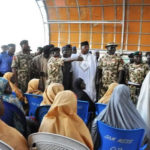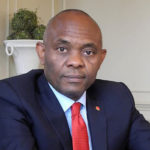
Co-Chair of the Bill and Melinda Gates Foundation, Bill Gates has said that Nigeria is one of the most dangerous places in the world to give birth, with the fourth-worst maternal mortality rate in the world, ahead of only Sierra Leone Central African Republic, and Chad.
He made the assertion at the expended National Economic Council (NEC) on Investment in Human Capital, presided over by Vice President Yemi Osinbajo, at the State House Conference Centre, Presidential Villa, Abuja, on Thursday.
He also announced that his foundation whose largest headquarters in Africa is sited in Nigeria has also committed the sum of $1.6billion in Nigeria with a plan to increase the amount.
“One in three Nigerian children is chronically malnourished. I do not enjoy speaking with you this bluntly when you have been gracious enough to invite me here. But I am applying an important lesson I earned from Alhaji Aliko Dangote.
“Recently, Aliko and I were having a conversation with several governors about their states’ official immunization rates. Aliko’s way of stressing the importance of accurate data was to tell us, ‘I didn’t get successful by pretending to sell bags of cement I didn’t have.’ I took from that that while it may be easier to be polite, it’s more important to face facts so that you can make progress.
“On immunization, you are already living that lesson: last year Nigeria revised its immunization coverage numbers downward to reflect more accurate sources, and I applaud you for those lower numbers.
“They may look worse, but they are more real, which is the first step toward saving and improving more lives.”
In his response, Osinbajo again blamed the President Goodluck Jonathan’s administration for allegedly failing to transform the lives of Nigerians despite making huge money from crude oil.
“But the ‘execution priorities’ don’t fully reflect people’s needs, prioritising physical capital over human capital.
“To anchor the economy over the long term, investments in infrastructure and competitiveness must go hand in hand with investments in people.
“People without roads, ports, and factories can’t flourish. And roads, ports, and factories without skilled workers to build and manage them can’t sustain an economy.”
Gates, who displayed a PowerPoint presentation of a model of the trajectory of Nigeria’s economic growth, relating to health and education, observed that if the present trend continues, the country cannot keep up with its population growth.
He added: “If current education and health trends continue-if you spend the same amount in these areas and get the same results-per capita GDP flatlines, with economic growth just barely keeping up with population growth.
“If things get worse, it will decline.
Unfortunately, this scenario is a very real possibility unless you intervene at both the federal and state levels. Because even in the worst-case scenario, your national income level is about to make you ineligible for certain kinds of development assistance and loans that you’ve been relying on to fund your health system and other priorities.
“Without more and better spent domestic money, investment in your people will decline by default as donor money shrinks-a lose-lose scenario for everyone.
“However, if you commit to getting better results in health and education-if you spend more and more effectively-per capita GDP will stay on its remarkable pre-recession trajectory.”
Gates, therefore, advised political leaders to maximize the country’s resources which are its people as a way to help the country to thrive.
He stated that Nigeria remains one of the most dangerous places in the world to give birth while one of three Nigeria children is chronically malnourished.
He further said: “The most important choice you can make is to maximize your greatest resource, the Nigerian, people.
“Nigeria will thrive when every Nigerian is able to thrive. If you invest in their health, education, and opportunities- the “human capital” we are talking about today- then they will lay the foundation for sustained prosperity.
“If you don’t, however, then it is very important to recognize that there will be a sharp limit on how much the country can grow.
“You see this risk in the data. From the point of view of the quality of life, much of Nigeria still looks like a low-income country.
“Let me give a few examples. In upper-middle-income countries, the average life expectancy is 75 years. In lower-middle-income countries, it’s 68. In low-income countries, it’s 62. In Nigeria, it is lower still: just 53 years
WATCH TOP VIDEOS FROM NIGERIAN TRIBUNE TV
- Let’s Talk About SELF-AWARENESS
- Is Your Confidence Mistaken for Pride? Let’s talk about it
- Is Etiquette About Perfection…Or Just Not Being Rude?
- Top Psychologist Reveal 3 Signs You’re Struggling With Imposter Syndrome
- Do You Pick Up Work-Related Calls at Midnight or Never? Let’s Talk About Boundaries






